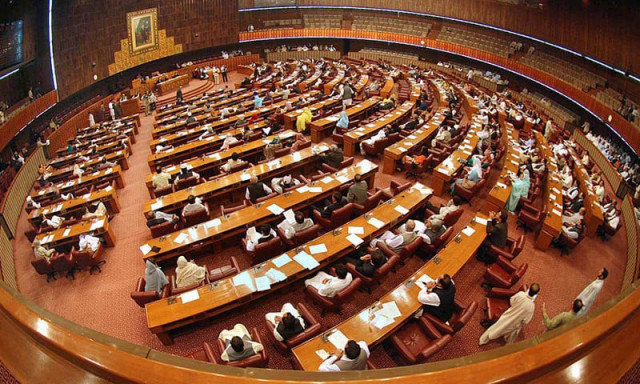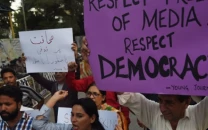Reserved seats dilemma
Dark clouds looming over ruling coalition's two-thirds majority in the NA

The Punjab Assembly’s move to suspend 27 lawmakers elected on reserved seats has thrown a spanner in the works for both the current party dynamics and the ruling coalition's ambitions to maintain a two-thirds majority in the National Assembly, casting a dark cloud over the government's strong presence in the house.
Should the Supreme Court take back reserved seats from the ruling alliance, it could potentially tip the scales, jeopardising their two-thirds majority ambition.
Punjab Assembly’s Speaker Malik Ahmed Khan’s ruling to suspend the lawmakers, which was lauded by the Pakistan Tehreek-e-Insaf (PTI)-turned the Sunni Ittehad Council (SIC), has also ignited PTI-SIC’s hopes that it will get back reserved seats in the national and other provincial assemblies.
Currently, the matter is pending before the SC where PTI-SIC the allocation of the reserved seats for women and non-Muslims to the political parties other than PTI-SIC is in violation of Article 51(6)(d) & (e) of the Constitution. It adds that the Election Commission of Pakistan (ECP) has acknowledged that SIC is a parliamentary party having 82 general seats in the National Assembly, therefore, it is entitled to reserved seats.
In response, the ECP has submitted that according to Articles 51 and 106 of the Constitution, the reserved seats have to be allocated on the proportional representation system only to those political parties who have contested the general elections and won at least one seat in the said elections.
Since PTI-SIC did not contest the elections and did not win even a single seat in the general elections, it maintained, it cannot be considered a political party in terms of Articles 51(6)(d) & (e) and 106(2)(c) of the Constitution.
Surely, things currently hang in the balance until the apex court finally decides that matter but it has nevertheless led the experts to say that the reversal of reserved seats would curtail the PML-N-led government’s plans to freely amend the constitution as it can’t do it without having a two-third majority – roughly 67 per cent or more of the total strength.
The two-thirds majority of the treasury benches had put the ruling coalition in a comfortable position in both houses to legislate and even permitted it to go for constitutional amendments without facing any hindrance from the opposition parties. However, it all now hinges upon the SC’s final decision.
Recently, while referring to the top court’s decision to suspend the Peshawar High Court’s verdict denying PTI-SIC reserved seats, the leader of the opposition in the National Assembly and the secretary general of PTI-SIC, Omar Ayub, recently said that the elections of PM, NA speaker and deputy speaker as well as the president have become controversial.
The opposition leader went on to say that all of these elections will have to be re-conducted as the government was standing on the crutches of Form-47 – the form through which ECP declares the winner in a constituency after the elections.
However, the experts differ with Ayub’s opinion as they point out that the Supreme Court's May 6 decision categorically states that “interim order relates to the disputed seats only” and “this order is to operate prospectively, w.e.f., from today.”
‘Govt can lose two-third majority in NA’
Renowned political expert, Majid Nizami, said that things will not be reversed as the top court has already clarified that the proceedings already conducted will not be affected. He, however, pointed out that the government can face two problems if it finally loses the reserved seats.
Firstly, Nizami said, it can lose a two-thirds majority in the National Assembly and this will be nothing less than a setback for the government; and secondly, it can somewhat affect the Senate elections as PTI-SIC can get more seats if it gets the reserved seats. “Overall, this will definitely be embarrassing for the government as it will lose the free hand during legislation it so desired,” he said.
While seconding what Nizami said, NUML University’s Professor Tahir Naeem Malik said it would surely be ‘embarrassing’ for the federal government to lose the seats it was claiming earlier on different grounds, saying it might hinder some plans for future legislation.
Professor Malik recalled that PTI faced several setbacks after losing its iconic election symbol of the cricket bat but the recent Supreme Court decision, however, was “the first relief for PTI in the parliamentary politics since it was deprived of bat symbol”.
Nevertheless, the professor concluded, that numbers usually don’t matter in Pakistan’s political scenario as they can somehow be obtained when the need arises, saying the no-confidence motion against the ex-premier Imran Khan was a case in point.
Late on Friday night, the ECP, which has remained at the centre of the attention since the issue of reserved seats surfaced, was quick to distance itself from the media reports about the ECP’s reaction to the Punjab Assembly speaker’s decision, saying neither it has expressed any opinion on the development nor directed its legal team to take any step.
In response to reports circulating on certain TV channels, the ECP has refuted any alleged reaction attributed to it regarding the decision on reserved seats.
The commission clarified that it has not issued any response concerning the speaker of the Punjab Assembly's decision on the reserved seats nor has it given any directives to its legal team regarding the matter.
Regarding this matter, the media reports are fabricated and groundless, devoid of any truth, the electoral body asserted.


















COMMENTS
Comments are moderated and generally will be posted if they are on-topic and not abusive.
For more information, please see our Comments FAQ